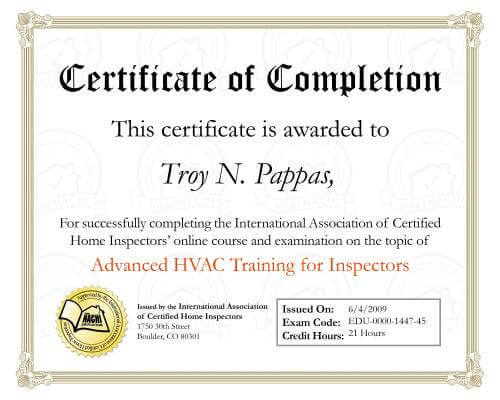What is a HVAC Technician?
HVAC technicians install and repair heating and cooling devices, whether that be heaters, air conditioners, or refrigeration units.
If it’s supposed to keep something hot or cold, typically an HVAC technician can fix it.
These technicians can work in construction, residential, or commercial areas, where they connect wires, weld pipes, and test electrical circuits.
There is a potential risk at every job site, so HVAC technicians must be thorough and focused every day.
Duties
- Install, maintain and repair heating and cooling units
- Diagnose electrical issues within HVAC units
- Perform warranty services
- Emergency repairs
- Keep record of daily installations and repairs
- Help customers with questions.
- Adhere to all state and federal codes for safety
- Manage relationships with all customers
- Order and maintain parts and tools needed for repairs and installation
HVAC Technician Salary
Every state has different salary ranges per year for HVAC technicians, so depending on where you plan to work, you could make more money than the state next door.
An HVAC mechanic just starting out in the business will make around $40,000 a year, but once you get more experience, education, and certification, you can make more than $52,000.
The average salary for an HVAC technician as of 2025 is $46,000, which isn’t too shabby.
Annually National Average Salary: $59,620
Average Annual Salary by State
| State | Avg. Annual Salary |
|---|---|
| Alabama | $49,380 |
| Alaska | $75,660 |
| Arizona | $55,340 |
| Arkansas | $49,340 |
| California | $70,050 |
| Colorado | $62,800 |
| Connecticut | $67,430 |
| Delaware | $64,180 |
| District of Columbia | $77,970 |
| Florida | $52,220 |
| Georgia | $53,500 |
| Hawaii | $74,200 |
| Idaho | $50,350 |
| Illinois | $69,000 |
| Indiana | $60,270 |
| Iowa | $57,930 |
| Kansas | $55,770 |
| Kentucky | $53,870 |
| Louisiana | $54,400 |
| Maine | $59,060 |
| Maryland | $66,510 |
| Massachusetts | $75,190 |
| Michigan | $57,290 |
| Minnesota | $68,410 |
| Mississippi | $47,420 |
| Missouri | $62,530 |
| Montana | $56,960 |
| Nebraska | $57,010 |
| Nevada | $60,610 |
| New Hampshire | $61,500 |
| New Jersey | $66,980 |
| New Mexico | $49,000 |
| New York | $68,950 |
| North Carolina | $52,960 |
| North Dakota | $64,320 |
| Ohio | $58,390 |
| Oklahoma | $51,860 |
| Oregon | $63,970 |
| Pennsylvania | $58,920 |
| Rhode Island | $63,650 |
| South Carolina | $52,240 |
| South Dakota | $57,650 |
| Tennessee | $50,410 |
| Texas | $54,640 |
| Utah | $56,440 |
| Vermont | $56,440 |
| Virginia | $58,770 |
| Washington | $72,340 |
| West Virginia | $46,820 |
| Wisconsin | $60,970 |
| Wyoming | $54,290 |
| Guam | $45,570 |
| Puerto Rico | $29,070 |
| Virgin Islands | $49,320 |
Annual Average Salary: Top 5 States
The top earning state in the field is District of Columbia, where the average salary is $77,970.
These are the top 5 earning states in the field:
Conducted by: Bureau of Labor Statistics, Department of Labor.
* Employment conditions in your area may vary.
How to Become an HVAC Technician
Step 1Get Your Diploma and GED
The skills needed for this profession can include chemistry, physics, as well as other physical science, so you should get your education and finish those much-needed courses.
Step 2Join an HVAC Program
After you have your diploma, it’s time to find a program in your area.
There are different types of HVAC programs available, it all depends on what you are looking for, and how much time you want to spend in school.
These programs can range from 6 months to 4 years, whether you get a certificate, an associates degree, or a bachelors degree.
How excited are you to get into the field?
No matter which course you take, you’re going to need hands on experience to work as an HVAC Tech.
Step 3Become an Apprentice
This is optional, additional training that an HVAC tech can do.
You’ll need 2,000 hours annually in this program, which is easy to do if you get a job right out of college or out of the training program.
This way, you can get even more education while also doing on the job training.
Step 4Get Hired
After you do all your course work and graduate, you’ll be on your way to employment.
This doesn’t mean you’re a certified HVAC technician yet, as that will come later, when you have the skills.
Until then, keep working toward your goal, and soon you’ll be able to pass the test.
Step 5Get Certified
There are several standardized tests that you can take across the US to become a professional certified technician.
There are tons of specific certifications, like HVAC performance verifying or HVAC efficiency analyst, or you can go for a broader spectrum like air conditioning, basic refrigeration or charging procedures.
Education
You have an option of which path to take in your quest to become an HVAC technician.
You can either obtain your certificate, which takes as little as 6 months, or go for the long stretch and get either your associates or bachelors degree.
While the last two may take longer, you will gain much more knowledge and even get educated on different areas.
Video About The Career
Certification
Even if it is optional to get certified in HVAC, it shows prospective employers that you are serious about the position.
If you are interested in learning more about what types of certifications there are, look no further:
HVAC Excellence is an organization that provide the HEAT (Heating, electrical, air conditioning technology) and HEAT Plus certifications.
North American Technician Excellence provides a basic exam with specifications in air conditioning, air distribution, oil and gas heating, hydronics gas and oils, as well as commercial refrigeration.
The Refrigeration Service Engineers Society offers a mandatory EPA Section 08 exam, as well as specialized certifications.
Find your local exam site online.
Certification Example:

Average Training Program Duration: 1-3 Years
Popular Programs
Earn your accredited, affordable HVAC career diploma online with Penn Foster in as little as 5 months!
Job Outlook
The job of an HVAC technician can be rewarding because of the ability to travel different places, meet new people, and learn exciting new techniques.
With that being said, the need for HVAC technicians is on the rise in the US, due to new homes and businesses going up every single day.
The next ten years for this field look outstanding.
Employment Growth Projection: 5%
2020
2030
That's a higher than average projected growth of 19,000 jobs.
HVAC Technician: Interest Over Time
Should You Become an HVAC Technician?
Overall Satisfaction: High

There is a high opportunity for advancement within this career.
You can even become your own boss, which means you can make your own schedule.
The stability of this job is wonderful, the employment runs throughout the year because of different heating and cooling issues per season.
The job is needed everywhere in the country.
Average Salary: Medium

The median pay for an HVAC technician is around $46,000, those that are certified in specific areas can make more.
Job Growth Outlook: High

Employees in the heating and cooling industry can expect to see a growth of around 14% until the year 2026.
There will be plenty of residential and commercial construction that will drive the employment rate up.
Education Duration: 1-3 Years

Depending on the route you want to take, education can be between one year and four years.
An HVAC technician that takes more time to get an education will have quite a lot of success in the business.
Though, it is possible to have a wonderful career with a certificate.
Achieving an associates or bachelors degree will allow more advancement, but can take longer, up to four years.
Personal Skills Needed

An HVAC Technician must be able to:
- Organize their work and meet specific deadlines
- Understand heating and cooling units and master their components
- Knowledge of heating/cooling measurements and calculations
- Use math in all units of measurement
- Have strong communication skills
- Have strong customer service skills
- Run piping and PVC
- Read and interpret different instructions and blueprints
Frequently Asked Questions
Q. What Is the Average Salary for an HVAC Technician?
The average salary for an HVAC technician is around $46,000, but this varies by state, as well as the company that you work for.
Q. How Long Does It Take to Become an HVAC Technician?
Whether you want a certificate, or a bachelors degree will depend on how much time you spend in school.
It could be 6 months (certificate) or up to 4 years (bachelors degree).
Many people earn an associates degree, which takes about 2 years.
Q. What Does an HVAC Technician Do?
An HVAC technician works with heating and cooling units to ensure the proper temperature of buildings and refrigeration units.
Q. What Is the Demand for HVAC Technicians?
HVAC technicians are in high demand, we lean on our HVAC technicians to maintain our level of comfort, after all.
Q. How Much Does It Cost to Become an HVAC Technician?
It can cost between $15,000 and $30,000, depending on the type of schooling you acquire.
Those who wish to acquire a bachelors or associates degree will pay more than someone who wants to obtain a certificate.









